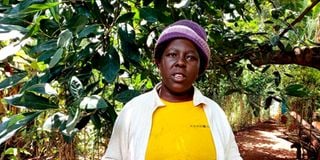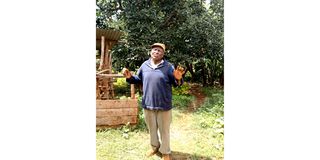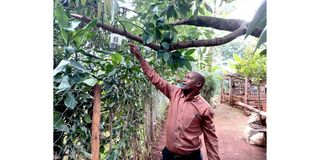Premium
Avocado theft: Murang'a farmers spend nights in their farms

Ms Rose Macharia at her farm in Kandara Constituency, Murang’a County. She is among farmers in the county who have suffered losses due to rampant theft of the fruits.
Two weeks ago, unknown men raided Samson Muraga’s farm in Kiranga village, Kandara, Murang’a County with the sole aim of stealing the avocados in his orchard.
The first time they struck, a neighbour alerted him that there were people picking his fruits. He responded, forcing the thieves to run away and leave their loot of about 476 pieces of avocado. The second time, they were not as lucky; they were caught red handed. They are currently remanded in a prison in Murang’a town awaiting their arraignment.
“The thieves are usually people known to us. These two are actually students… They are known for stealing avocados and stashing them in their backpacks. They strike mostly during lunch hours when they are sure you have left the farm, or early in the morning when we are asleep,” he said. Young men are usually contracted to do the dirty work by brokers who pay as low as Sh3 per fruit.

Mr John Mwaniki, the chairman of the Murang’a Avocado association. He said avocado farmers are losing Sh3.5 billion to thugs annually which is 32 per cent of the total production of fruits picked by 15, 000 farmers in the association.
For the last two years, avocado farmers have been forced to spend the night guarding their farms to prevent thieves from harvesting their produce, which now fetches high prices. Some have hired watchmen, but they have been outnumbered by panga-wielding gangs.
So daring are the thieves that farmers have opted to miss church services to guard their farms. And even when the village is mourning, there are volunteers, usually around 10 men, who offer to do rounds in the farms just to ensure there is no one harvesting the farmers’ produce.
Another common strategy that the thieves who move in groups use, is having one or two start small talk with the owner of the farm within their home as their colleagues harvest fruits in the shamba.
Beauty products
Mr Muraga’s experience is common to dozens of farmers in the constituency whose main economic mainstay has shifted from coffee to avocado and macadamia farming. The thugs, after a successful raid, sell their loot to brokers and tens of cottage industries that have mushroomed in shopping centres for oil processing. The oils are then sold as beauty products.
“These kiosks are now our greatest enemies because while the export market demands quality fruit, the processors do not care, provided they receive the fruits, which they buy at Sh3 to Sh5 per kilo. With no discriminating on quality and source, farmers are suffering massive loses,” added Mr Muraga. He sells his farm produce to private companies such as Kakuzi and Fairtrade for export at between Sh10 and Sh15 per fruit.
In Noru village, Javasone Ndung’u an octogenarian, has relied on farming avocado, macadamia and coffee for years, but he is on the verge of throwing in the towel as thieves have stolen the joy in his farming. He said that those that have stolen from him are his nephews or people well-known to him.

Mr Javasone Ndung’u at his farm in Noru Village located in Kandara constituency in Murang'a county. For two seasons he has not harvested avocados in his farm due to increased theft.
“I was once alerted that they had been spotted leaving the farm with gunny bags full of avocados from my farm… it was at five in the morning. We ambushed them with over 800 pieces of fruit ... They attempted to attack us with pangas when I threatened to report them to the police,” he narrated.
A lot of his frustration, Mr Ndung’u said, was drawn from the fact that after making a report to the police, he was asked to go back home and bring the fruits he had recovered as exhibits.
“The fruits rotted in the station as I waited for action to be taken against the thieves who had already gone into hiding ... I went to seek help again and the good officer told me to bring the culprit ... How will we get help? Where do I go? We have a problem,” he said. The farmers speculate that the officers and other security agents are working with brokers to frustrate their efforts of ending avocado theft.
Quality fruit
“Of course the broker is after the good, mature and quality fruit while the low quality ones are going to local processors who have set up kiosks even in their homes and we are wondering who is licensing these cottage industries. They are mushrooming everywhere and they are a big threat to us,” said Mr Ndung’u.

Mr John Mburu, the manager of the Murang’a Avocado association showing some of the traps they have invested in to ensure the farmers' fruits are not attacked by fruit flies. The traps have helped cut down losses by 40 to 65 per cent.
Avocados have two seasons in a year – main season is between March and July and the late crop is harvested from September to December. Farmers are likely to fetch more during the off season when main growers are not harvesting.
But what has prompted avocado theft? Brokers operating on behalf of unscrupulous exporters open the market way before the actual market is ready to receive the fruits. They offer money to people in the village to steal on their behalf, forcing a majority of the farmers to sell their produce earlier to undercut the thieves.
Before reaching Rose Macharia’s farm in the same village, we spotted two pick-ups packed alongside the farms dotting avocado fruits ready for harvest. She offers that the cars belong to brokers who are waiting for avocados from the farms. She has about 35 trees of the Hass variety and has suffered theft many times.
“When the picking season opens, they usually steal weeks before. In February, we suffered greatly because they stole both the mature and immature fruits. That led most of us to start harvesting early so that we can at least earn something,” she said.
From a single tree, a farmer can make from Sh4, 000 to Sh28, 000 making avocado farming one of the most lucrative activities in Central Kenya.
“We now value avocados more than any other crop, if only we can be assured of security. When we have to go to church, we tell our children who leave earlier to guard the farms,” she said.
Murang’a has about 11 cooperatives that sell avocados on behalf of farmers through a binding contract with exporters. And there are 96, 000 avocado farmers in the county.
A kilogramme of the fruit is currently selling at Sh70, which about four. In December, the farmers were paid 100 per kilo, averaging Sh25 per fruit.
Mr Joseph Mburu owns 24 trees. He has spent a number of nights under one protecting his fruits from thieves. This year alone, he has lost about Sh300,000 to theft.
Stiffer punishment
“The penalties meted out on these thieves are the real cause of this trouble ... they should have stiffer punishment to discourage them from raiding our farms. These are young boys giving us sleepless nights ... They have coded stealing as ‘science’ so when we hear them say they are going for science, we know that they will be robbing a farm that night,” he said.
He added that packing houses were paying brokers to buy from people who were stealing and posing as farmers. According to the farmer, there should be licensing of cottage industries and buyers of avocados should ensure they know the source of the fruits they are buying.
Mr Mburu said that the regulations to be put in place should ensure that anyone found in possession of a large avocados consignment without proper documentation should be charged as thieves He further suggested that transportation of the fruits from the farm to the market should be backed by a permit from the administrators.





